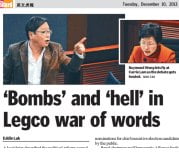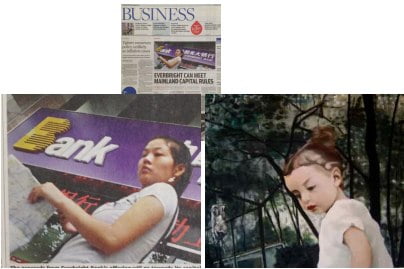While Hong Kong’s governmental system sometimes seems doomed to permanent disrepair, the dynamics of the reform debate are in a state of flux. The tycoon-oriented ‘pro-business’ parties, long the most vocal – not to say gleefully contemptuous – in opposing democracy, are more subdued these days, almost as if they are afraid that open resistance would invite more radical and populist eventual upheaval. Meanwhile, the traditional, patriotic pro-Beijing front has loosened up a bit. Some factions still dutifully recite the correct and vague party line/holding statement, but elsewhere a hundred flowers sort of blossom, with Tsang Yok-sing pretty much conceding that the current system is a mess, and another DAB member blurting out off-message (if not very meaningful) ideas. Even top officials are disowning the status quo, with Carrie Lam admitting that government legitimacy requires ‘one man, one vote’ and saying that she thinks Beijing knows it’s the only way out.
The pro-democrats, always a broad spectrum, are dividing into ‘absolutists’, like the radical activists, on one side and ‘realist’ moderate types on the other, with a big grouping in the middle posing as ‘people who talk like a more sensible sort of absolutist but could turn into principled realists if given a bit of what  they want’. Firebrand Wong Yuk-man warns that instead of eggs, it’ll be petrol bombs if the whole public can’t take part in nominating Chief Executive candidates, while the Civic Party’s Ronnie Tong accepts that when the Basic Law says ‘nomination committee’ it means a ‘committee’. The Democratic Party talks tough but might blink.
they want’. Firebrand Wong Yuk-man warns that instead of eggs, it’ll be petrol bombs if the whole public can’t take part in nominating Chief Executive candidates, while the Civic Party’s Ronnie Tong accepts that when the Basic Law says ‘nomination committee’ it means a ‘committee’. The Democratic Party talks tough but might blink.
This is the big bone of contention: is ‘public nomination’ essential-albeit-unacceptable-to-Beijing because a nomination committee can so easily be designed to screen out would-be candidates who are unacceptable-to-Beijing? Get your head around that.
Or – don’t bother. That’s the advice of maverick patriot Lau Nai-keung. While Lau cannot exactly be described as the voice of reason, his mouth-frothing loathing of the pro-democrats often takes precedence over his loyalty to the motherland, with the result that he speaks unpalatable truths that the more self-controlled pro-Beijing figures avoid uttering.
He is mightily pissed off with the Hong Kong government for producing a constitutional reform consultation document that – to him – both disrespects top Chinese officials and misleads the local public by ignoring Beijing’s previous unambiguous statements that the nomination-committee thing is not even up for debate. ‘Unambiguous’ here means ‘undetectable by mere mortals’, but in Lau’s no-nonsense and obsessive world, we all share his superhuman capacity for insight. (“Hear, ye deaf; and look, ye blind, that ye may see.” – Isaiah 42:18.)
Any significant tampering with the existing (rigged) nomination committee would “undermine the central government’s sense of security,” he says. In other words, the Communist Party is paranoid and petrified, like a little child that can’t sleep with the light off because otherwise a big green slimy monster will crawl out from under the bed, or an evil half-goat cannibal ghost will float malevolently in through the wall. It’s obvious to Lau; why don’t the rest of us get it?
One answer is that he is deluded and wrong. But of course he’s not. Just because he rants like a lunatic in a strait-jacket doesn’t mean he’s not right.
And all the time, Carrie Lam and everyone else knows the status quo cannot continue, and the mainstream pro-dems mull how far they can go with their threats of Occupy Central and a Legislative Council reform-bill veto in their game of chicken with Beijing.
On the subject of children’s and others’ perceptions and fears of the unknown, a weird lookalike: the AFP file photo of a person outside a branch of China Everbright Bank seen on the front page of today’s South China Morning Post Business section, and Belgian artist Julien Rouvroy’s Wunderkind… 

Wong Yuk-man went too far. However, it was interesting seeing him lecture someone who is essentially controlled by the Communist Party, about the ‘need for a revolution’. In this sense the ‘revolutionaries’ of the past have become the establishment. The egg throwing thing is also a stunt that will end in tears. How do they up the ante on that? We’ve had bananas and balloon powered banners. What’s next? Faeces? Plenty of that around already.
Part of the new constitution should clearly state what constitutes an acceptable missile. Fresh eggs would be deemed OK, hard-boiled a no-no.
How about bad eggs ?
Lots of those in Legco (or at least there should be – but their seats always look vacant during the TV reports)
Depending on whether or not they were shelled.
Fine piece throughout from Hemlock.
The problem with LNK is that (thanks to his pet evil foreign forces writer, he is cogent and coherent — except when, invariably, his guard slips.
He even admits that the less “elite” the Nomination Committee is, the greater the legitimacy of the resulting CE. This is surely tantamount to admitting that the whole process is intrinsically flawed, that we’re not being offered any universal suffrage after all, that no shred of democracy can ever exist in a one-party country.
Fresh? Boiled? All too inchoate. How about that Philippines’ delicacy, bulot? Let’s say a ten days old specimen. Full of rich symbolism.
Dog eggs would do a far better job of causing a stink. And perhaps some soiled sanitary products for Vagina.
Hard to see how DAB can really be ‘off message’ when they haven’t decided what the message is yet? I suppose any message if off message at the moment…
This is funny though:
http://www.huffingtonpost.com/yuen-chan/lufsig-hong-kong_b_4414080.html?1386638274
let he who hath ears hear it
When you are up against The Village Idiot…like “Wolf” Leung was in the CE election…anyone can look smart and sneaky…
…and has…Anyone…tried to squash an egg from both ends ?
As I’ve pointed out in my blog today, there is a fundamental contradiction between the Basic Law’s requirement that the nominating committee be “broadly representative”, and the NPC Standing Committee’s ruling that it should follow the composition of the current – thoroughly unrepresentative – election committee. This is being largely glossed over by the government, which probably hopes that a few minor changes to the committee will be enough to massage public perceptions of this fact.
Lau Nai-keung bluntly disagrees. In his view, the composition of the committee is Beijing’s business, and the best the Hong Kong people can hope for is to influence the voting method for the candidates we are graciously allowed to choose between.
This will of course leave us with an election that does not satisfy the Basic Law’s representativeness requirement and will probably not satisfy the aspirations of the Hong Kong people either. But as Lau says, this is as much about politics as law. In his view, the end result will somehow emerge as “fair and balanced” – presumably in the Fox News sense of that phrase.